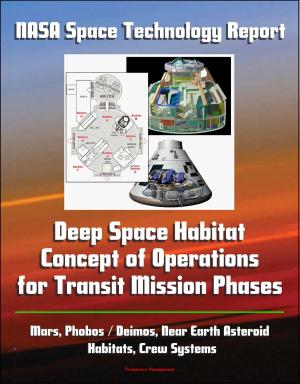NASA Human Spaceflight Astronaut Health Research for Exploration and Manned Mars Missions, Risk Report WSN-07, Human Computer Interaction, Task Design, Injury from Dynamic Loads, Food System Illness
Nonfiction, Science & Nature, Technology, Aeronautics & Astronautics| Author: | Progressive Management | ISBN: | 9781311718624 |
| Publisher: | Progressive Management | Publication: | May 4, 2016 |
| Imprint: | Smashwords Edition | Language: | English |
| Author: | Progressive Management |
| ISBN: | 9781311718624 |
| Publisher: | Progressive Management |
| Publication: | May 4, 2016 |
| Imprint: | Smashwords Edition |
| Language: | English |
Professionally converted for accurate flowing-text e-book format reproduction, this series of reports deals with ongoing research by NASA into a risk reduction strategy for human space exploration and planned manned missions to Mars. Each report deals with a unique aspect of the human research needed to pursue long-duration missions. Many of the reports contain exclusive details about medical events impacting astronauts and cosmonauts on earlier flights, including Mir, Space Shuttle, and ISS Space Station missions.
Each risk Evidence Report contains a narrative discussion of the risk and its supporting evidence. All cited publicly-available references are listed at the end of the report. In addition, data that are significant or pivotal are summarized in text, tables, and charts in sufficient detail to allow the reader to critique the data and draw conclusions. The authors also indicate whether the data are from human, animal, or tissue, cellular, or molecular studies. The reports discuss evidence from both spaceflight (including biomedical research, Medical Requirements Integration Document [MRID] data, and operational performance or clinical observations) and ground (including space analog research and non-space analog biomedical or clinical research) research. When providing evidence from ground-based studies, authors discuss why these results are likely to be applicable in the space environment, offering any available validation information for the use of these ground-based systems.
Reports included in this compilation:
Evidence Report: Risk of Inadequate Human-Computer Interaction * Evidence Report: Risk of Inadequate Critical Task Design * Evidence Report: Risk of Injury Due to Dynamic Loads * Evidence Report: Risk of Performance Decrement and Crew Illness Due to an Inadequate Food System
Crew survival will be heavily dependent on available electronic information for just-in-time training, procedure execution, and vehicle or system maintenance; hence, the criticality of the Risk of Inadequate HCI. Future work must focus on identifying the most important contributing risk factors, evaluating their contribution to the overall risk, and developing appropriate mitigations.
Crew health and performance is critical to successful human exploration beyond low Earth orbit. The Human Research Program (HRP) investigates and mitigates the highest risks to human health and performance, providing essential countermeasures and technologies for human space exploration. Risks include physiological and performance effects from hazards such as radiation, altered gravity, and hostile environments, as well as unique challenges in medical support, human factors, and behavioral health support. The HRP utilizes an Integrated Research Plan (IRP) to identify the approach and research activities planned to address these risks, which are assigned to specific Elements within the program.
The HRP utilizes various research platforms to conduct research. Ground research occurs in laboratories and analogs that mimic a portion of the spaceflight environment. In addition, the International Space Station (ISS) is used to conduct research requiring the unique environment of space.
Professionally converted for accurate flowing-text e-book format reproduction, this series of reports deals with ongoing research by NASA into a risk reduction strategy for human space exploration and planned manned missions to Mars. Each report deals with a unique aspect of the human research needed to pursue long-duration missions. Many of the reports contain exclusive details about medical events impacting astronauts and cosmonauts on earlier flights, including Mir, Space Shuttle, and ISS Space Station missions.
Each risk Evidence Report contains a narrative discussion of the risk and its supporting evidence. All cited publicly-available references are listed at the end of the report. In addition, data that are significant or pivotal are summarized in text, tables, and charts in sufficient detail to allow the reader to critique the data and draw conclusions. The authors also indicate whether the data are from human, animal, or tissue, cellular, or molecular studies. The reports discuss evidence from both spaceflight (including biomedical research, Medical Requirements Integration Document [MRID] data, and operational performance or clinical observations) and ground (including space analog research and non-space analog biomedical or clinical research) research. When providing evidence from ground-based studies, authors discuss why these results are likely to be applicable in the space environment, offering any available validation information for the use of these ground-based systems.
Reports included in this compilation:
Evidence Report: Risk of Inadequate Human-Computer Interaction * Evidence Report: Risk of Inadequate Critical Task Design * Evidence Report: Risk of Injury Due to Dynamic Loads * Evidence Report: Risk of Performance Decrement and Crew Illness Due to an Inadequate Food System
Crew survival will be heavily dependent on available electronic information for just-in-time training, procedure execution, and vehicle or system maintenance; hence, the criticality of the Risk of Inadequate HCI. Future work must focus on identifying the most important contributing risk factors, evaluating their contribution to the overall risk, and developing appropriate mitigations.
Crew health and performance is critical to successful human exploration beyond low Earth orbit. The Human Research Program (HRP) investigates and mitigates the highest risks to human health and performance, providing essential countermeasures and technologies for human space exploration. Risks include physiological and performance effects from hazards such as radiation, altered gravity, and hostile environments, as well as unique challenges in medical support, human factors, and behavioral health support. The HRP utilizes an Integrated Research Plan (IRP) to identify the approach and research activities planned to address these risks, which are assigned to specific Elements within the program.
The HRP utilizes various research platforms to conduct research. Ground research occurs in laboratories and analogs that mimic a portion of the spaceflight environment. In addition, the International Space Station (ISS) is used to conduct research requiring the unique environment of space.















